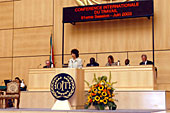|
 Printer-Friendly Version Printer-Friendly Version
As Delivered
Address to the 91st Session of the International Labor Conference
Palais des Nations
Geneva, Switzerland
June 11, 2003
 It’s a pleasure to be here representing the United States at the
91st session of the International Labor Conference. Let me add my congratulations to the Vice President of Kenya for his election as President of the Conference. It’s a pleasure to be here representing the United States at the
91st session of the International Labor Conference. Let me add my congratulations to the Vice President of Kenya for his election as President of the Conference.
I would also like to note the Director-General’s report, “Working Out of Poverty,” which addresses one of the most difficult challenges facing the world today.
One line in the introduction captures that challenge succinctly. It reads, “People in poverty go through each day with the will to survive, but without the support and possibilities to move up the ladder of opportunity.” It is our job as Ministers of Labor to help make that ladder
accessible. So this morning I would like to share with you the approach the United States is taking to help child laborers and those whose lives are imperiled by HIV/AIDS reach for and climb that ladder.
Since 1995, the United States government has provided more than $313 million to fund international projects aimed at preventing and eliminating child labor in 51 countries. These projects are designed to remove children from hazardous work environments and exploitive conditions, to provide
educational opportunities for child laborers, and to conduct research and raise awareness about the child labor issue.
One form of child labor deserves special attention—that is the heartbreaking plight of child soldiers. There are an estimated 300,000 children around the world who are involved in armed conflicts. These children are brutalized and forced to serve as combatants, guards, spies, and even
prostitutes. They are robbed of their innocence, placed in harms way on a daily basis and deprived of any hope for a normal life.
This is one form of exploitation that no member of the community of civilized nations can evertolerate. That is why in May of this year, I convened an International Conference in Washington, D.C. that brought
together 500 representatives from nations and agencies committed to ending this horror. We were pleased that Director General Somavia and other ILO officials could join us for this milestone.
At that conference, I announced a new $13 million Labor Department global initiative to prevent and rehabilitate child soldiers. This includes $7 million funded through the ILO’s IPEC program; a $3 million project to address the educational needs of former child soldiers in Uganda; and, a
$3 million education project for child soldiers in Afghanistan.
This is just one example of the United States government’s commitment to work with all nations to eliminate this practice and to save children from the terrible life of a child soldier. I am gratified that the ILO has dedicated tomorrow, June 12th, as the second annual world
day against child labor and that the plight of children trafficked into armed conflict will be a focus of that observance. We cannot give child soldiers back their childhood. But we must help them rebuild their lives.
Another tragedy preventing vulnerable workers from accessing the ladder of opportunity is the HIV/AIDS pandemic. Today, 42 million people are living with HIV. Some experts estimate that in Africa’s hardest hit countries, as many as 1 in 5 working-age adults are infected with HIV. It is
one of the greatest social, labor and economic challenges of our time and has tragically taken the lives of more than 20 million people. This has tremendous implications for economic development and deprives many workers of the most productive years of their lives.
I am proud that the United States, under the leadership of President George W. Bush, has launched an unprecedented emergency relief effort to fight the global HIV/AIDS pandemic. President Bush has committed $15 billion over the next 5 years to turn the tide against HIV in the most afflicted
nations of Africa and the Caribbean. The goals of the initiative are to:
- Prevent 7 million new infections;
- Treat 2 million HIV-infected people;
- Care for 10 million HIV-infected individuals and AIDS orphans.
As part of this effort, the Labor Department is fighting the HIV/AIDS pandemic with a variety of strategies to support employers and workers. The Department funds HIV/AIDS prevention education in the workplace. The Department provides technical assistance to develop non-discrimination policies
towards those workers afflicted with HIV/AIDS. And we are collaborating with government, labor and business leaders to encourage the development of supportive workplace environments.
The Labor Department has already provided $19.5 million for 17 HIV/AIDS projects in 16 countries. We expect to do more as the Department implements the President’s emergency relief plan. An additional $10 million has been designated for this program and we are pleased to be working in
partnership with the ILO on expanding HIV/AIDS programs.
Both of the initiatives I have outlined today—eliminating the use of children for armed conflict and helping HIV/AIDS afflicted workers—can make a real difference for the world’s children and for the world’s workers. I thank the member states working with us on these
initiatives and encourage my colleagues in the ILO to join us in supporting these worthy goals.
Thank you.
# # #
_________________________________________________________________
| 


